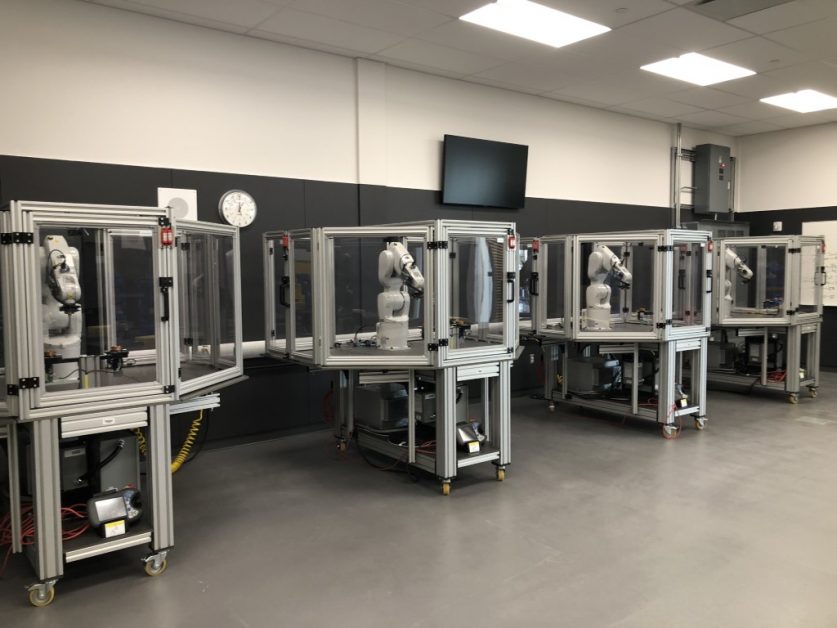By Val Rossi and Kyla Girling of Writers Block Solutions
Whether it’s reviewing a start-up idea sketched on the back of a napkin or working with an industry leader automating long-standing processes, the Selkirk Technology Access Centre (STAC) is lending its advanced manufacturing expertise to Lower Columbia professionals and helping take concepts from prototype to market.
The rural technology centre is one of 60 Technology Access Centres (TACs) across the country assisting Canadian businesses—particularly small-and-medium-sized enterprises—by providing applied research and innovation services. These centres help build new prototypes and solve unique business challenges, and provide specialized training on the latest equipment and emerging technologies. Their goal is to enhance productivity, competitiveness, and innovation for their industry partners.
There’s no doubt that STAC in Trail is driving circular economy innovation, facilitating the more rapid development of cleantech, and changing the business landscape in the Lower Columbia and beyond. When it comes to training students for the jobs of tomorrow, fostering and retaining qualified local talent, and manufacturing goods this is especially apparent.
“One of the first questions we ask is: how can we help manufacture parts utilizing reclaimed or renewable resources?” explains STAC’s Chair and Lead Researcher Jason Taylor. “We look at byproducts from companies’ processes to see if there are opportunities. And we’re very much a part of the local ecosystem, so sometimes those opportunities are finding ways to keep work local. We know who provides what services, and it cuts down on excessive transportation and outsourcing when we can provide certain services and then also act as a conduit for area referrals.”
STAC boasts a suite of services designed to build competitiveness in research and development, specifically for companies exploring technical expertise and specialized equipment to advance product design and manufacturing or optimize a process or system. The centre offers 3D printing, 3D scanning, rapid prototyping, data specialist expertise, reverse engineering, metrology, customized advanced technology, and training. Another important facet of their operation is offering referrals to existing businesses in the region, as they are committed to supporting local companies rather than competing with them.
Rural Tech Centre Upskills Local Talent
Local manufacturing has become even more prevalent since the pandemic exposed how much Canada relies on foreign supply chains. Examining this has increased the desire to close the loop closer to home, supporting STAC’s mission to strengthen the economy by giving local professionals the tools to do the work here. This open, collaborative approach is growing STAC’s network, as the team continues to welcome qualified experts to the Metal Tech Alley region, which is known for technological and metallurgical advancement.
As a launch pad for innovation, the centre’s presence in the region is helping attract more tech professionals, upping the area’s already substantial reputation. Further highlighting the need to support the local manufacturing sector, Selkirk’s new Digital Fabrication & Design program is now turning out qualified professionals, upskilling the local talent pool and supporting the established companies recruiting for advanced manufacturing and process operations.
“STAC is creating deep ties between business development and academic research, and fostering greater collaboration between local businesses,” says Lower Columbia Initiative Corporation (LCIC)’s Economic Development Coordinator Rebecca Richards. “These factors promote innovation and the use of tech in industry, which will be important for regional economic growth and long-term stability.”
Reverse engineering makes up about half of STAC’s current workload and the future looks to be much the same, with industry giants like Kalesnikoff and Mercer Celgar changing their processes to look at more automation and just-in-time manufacturing and less warehousing of parts and machine equipment.
There’s no project too small for STAC, which is more about customization than mass production and lends its expertise to individuals as well as companies; for example, a mechanic restoring a vintage car may turn to the centre for a discontinued part. The STAC team truly supports a broad range of projects that touch every industry or need imaginable.
STAC as a Metal Tech Alley Conduit
While acquiring and testing equipment to determine if it’s really what a client may need normally can cost hundreds of thousands of dollars, STAC facilitates the process and provides individuals and businesses with significant cost savings. Their specialized staff also provide consultation and recommendations.
As awareness around its services grows, Taylor says the centre continues to gain further support, with close to $400,000 in new equipment secured this past year alone.Their efforts are supported by provincial and federal government funding, and those engaging STAC’s services may either pursue possible research grant funding opportunities themselves or pay direct fees-for-service.
LCIC is working diligently on improving the circular economy framework in the region by establishing public policy and built-in business cases and investigating a possible industrial park. The organization is also hosting the Industrial Circular Economy Conference (ICE) online from June 8 – 10, 2021. The team behind Metal Tech Alley is proud that their movement towards a more sustainable economic structure aligns with STAC’s mission. Working alongside industry leaders like Taylor and leaning on the natural resources and expertise already readily available in the region helps build a more robust future for all.
“STAC makes it possible for businesses to improve process efficiency and find solutions more easily by providing a designated facility for innovation and testing, as well as on-site support,” explains Richards. “STAC is already helping businesses subvert their reliance on manufacturers for spare parts, which reduces the environmental impact and makes repairs cheaper and easier. Because companies are now better able to close loops in their supply chains locally, this is a positive step towards circularity.”
For more information on STAC’s projects click here




